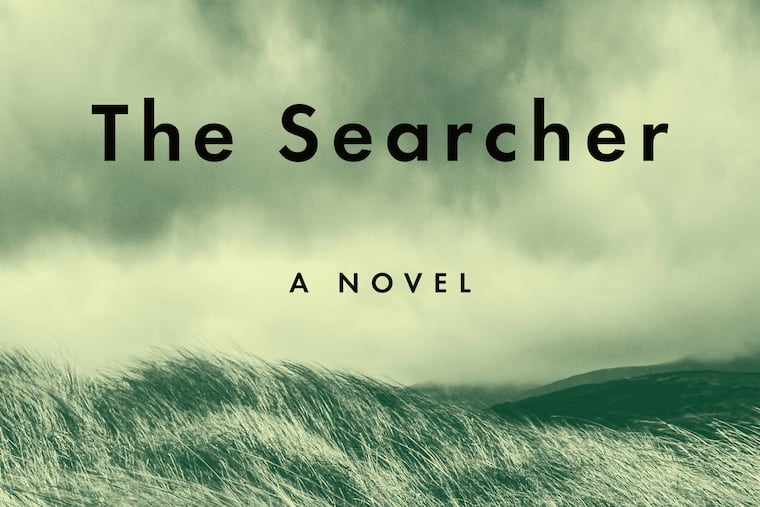Tana French’s 'The Searcher’ is a nod to a famous Western, but set in the west of Ireland | Book review
A retired Chicago cop ferrets out a bog's worth of secrets and sins in a new standalone book by the writer best known for her Dublin Murder Squad series.

The Searcher
By Tana French
Viking. 464 pp. $27
Reviewed by Maureen Corrigan
The Searcher, by Tana French, is a slow burn of a suspense story. As in that apocryphal myth of the frog in boiling water, the novel lulls us readers to lie back and bask in French’s radiant imagery and language — in particular, its descriptions of the rough beauty of the west of Ireland where the story takes place. Then, the heat is turned up, higher and higher. By novel’s end, anyplace — even the grimiest, meanest streets of hard-boiled crime fiction — seems preferable to the sinister and silent watchfulness of the lush Irish countryside.
As French has acknowledged in interviews, the title of her latest stand-alone crime novel is a nod to the John Ford masterpiece, The Searchers. Like Ford’s 1956 film, French’s novel is essentially a Western. (Perhaps even that “west of Ireland” setting is a sly wink at the novel’s generic origins.) A lone man, an outsider, is drawn into an obsessive quest to find a young person who has disappeared. In Ford’s film, Civil War veteran Ethan Edwards, played by John Wayne, searches for his niece, who was abducted from her family’s homestead by a Comanche raiding party.
French’s “old soldier” is named Cal Hooper. He’s divorced, semi-estranged from his adult daughter, and recently retired from the Chicago Police Department. With no ties to bind him, Cal has acted on his dream and bought a tumbledown Irish cottage advertised on the internet. It’s so remote, he can blast his favorite Johnny Cash tunes as he spackles and paints, and only the sheep might complain. If the condition of the cottage was somewhat misleading, other aspects of Cal’s new surroundings delight him. “The air is rich as fruitcake, like you should do more with it than just breathe it; bite off a big mouthful, maybe, or rub handfuls of it over your face.”
But, as the mists of autumn close in, Cal realizes that he’s not as alone as he thought. The back of his neck — “trained over twenty-five years in the Chicago PD” — registers a watcher, someone who’s been creeping around the cottage and disturbing the nesting rooks. When Cal corners the voyeur, he turns out to be a wayward adolescent named Trey Reddy, who lives on a nearby mountain with his single mother and siblings. Before long, Trey is coming around regularly to help Cal and to learn carpentry. One thing Trey doesn’t need to learn is that Cal is an ex-cop. (Everyone in the nearest village has sussed out by Celtic telepathy that the American who bought the cottage is an ex-cop.) Eventually, Trey confesses the real reason he’s been hanging around: He wants Cal to find out what happened to his beloved 19-year-old brother, Brendan, who vanished from the family cottage months ago. The local police have been useless, prejudiced, as they are, against the entire Reddy family as a pack of lazy troublemakers. So it is that Cal, despite his reluctance, gets drawn into the case — as we readers know he will — because that’s what makes these quiet men who preside over Westerns and detective novels the flawed heroes they are. In the process of searching for Brendan, Cal ferrets out a bog’s worth of secrets and sins festering beneath this quaint patch of the Auld Sod.
To even disclose this much of the plot of The Searcher is a minor crime, because the great power of this suspense story comes from its slow, measured pacing and the intensifying evil of its atmosphere. One of the most unsettling moments in the novel is an extended scene in which Cal visits the local pub called Sean Óg’s — basically, another isolated cottage in a field — and the men who are gathered there press shot after shot of the locally crafted “poteen” on him. As a tin whistle plays in the background and the men joke and Cal gets drunker, one part of his brain registers that he’s being subtly “warned off” the investigation into Brendan’s disappearance. And, it’s not only the human residents of the area who are all-too-knowledgeable about Cal’s movements. The very landscape seems to be in collusion with whatever malevolent forces spirited Brendan away. Here’s Cal walking down a lane and ruing his impulsive life choices:
"The morning has turned lavishly beautiful. The autumn sun gives the greens of the fields an impossible, mythic radiance and transforms the back roads into light-muddled paths where a goblin with a riddle, or a pretty maiden with a basket, could be waiting around every gorse-and-bramble bend. Cal is in no mood to appreciate any of it. He feels like this specific beauty is central to the illusion that lulled him into stupidity, turned him into the peasant gazing slack-jawed at this handful of gold coins till they melt into dead leaves in front of his eyes."
French’s writing, as that passage illustrates, is eerie and nuanced. Indeed, even though her Dublin Murder Squad series and her other stand-alone mystery, The Witch Elm, have been uniformly excellent, this hushed suspense tale about thwarted dreams of escape may be her best yet. Like the John Ford film it pays homage to, The Searcher is its own kind of masterpiece.
Corrigan, who is the book critic for the NPR program “Fresh Air,” teaches literature at Georgetown University. She wrote this for the Washington Post.